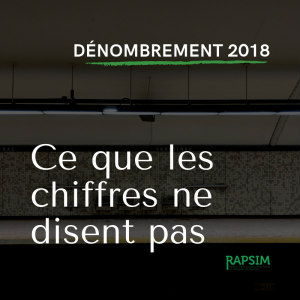Montreal Homeless Census, or, the Invisible Women Experiencing Homelessness
 On March 25, 2019, the City of Montreal published the results of its most recent census of people experiencing homelessness in Montreal. It was the City’s second such initiative, the first having taken place in 2015. The Table des groupes de femmes de Montréal wishes to express several concerns about this project.
On March 25, 2019, the City of Montreal published the results of its most recent census of people experiencing homelessness in Montreal. It was the City’s second such initiative, the first having taken place in 2015. The Table des groupes de femmes de Montréal wishes to express several concerns about this project.
This count hides an important reality of homelessness in Montreal. Its method doesn’t just simplify a complex phenomenon to an embarrassing extent—it doesn’t allow for a true count of the number of people actually in the street. The truth is, homelessness is not always visible: it can be transient, episodic and, especially, hidden. For example, the census counted that only 23% of the those experiencing visible homelessness in Montreal were women. As RAPSIM points out, a 2016 study by Statistics Canada indicated that roughly equal proportions of men and women have experienced a situation of hidden homelessness at some point in their lives. The Table des groupes de femmes de Montréal would therefore like to highlight, in bold, the methodological limitations of this count and speak out against how the reality of women experiencing homelessness is rendered invisible, especially when these women already see their existence being denied by society.
The Table also hopes that the City will go beyond mere tallies to consider the many faces, trajectories and realities of people experiencing homelessness. A differential gender-based analysis (GBA+) would highlight the factors and forms of systemic discrimination that specifically affect women. An intersectional analysis that accounts for existing inequalities between different women and other systems of oppression (ageism, ableism, racism and heterosexism, among others) is necessary to paint a more accurate and thorough picture of the factors contributing to precarity for Montreal women.
As mentioned in the Déclaration sur l’itinérance des femmes, developed by the Table des groupes de femmes and its partners in 2016, the fight to end homelessness for women requires real political engagement. Recognizing the expertise and diversity of actions contributed by community organizations is critical. These organizations work on a daily basis to improve living conditions for women experiencing homelessness, access additional financing, increase available social housing that responds to universal norms for accessibility and, finally, conduct large-scale research studies on specific issues related to the experience of homelessness among women that take their expertise on the front line into account.
Naturally, even all of these measures, taken together, can’t take the place of a real and concerted effort to end poverty, social exclusion, and the systemic discrimination experienced by women in all their diversity, so that equality on paper can become equality in reality.